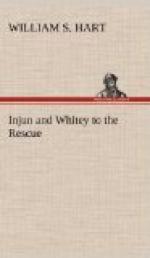It is not likely that there was an idea of poetic justice in the mind of Mart Cooley; a thought that in stampeding the sheep he was repaying the sheepmen in their own coin for stampeding the cattle, repaying them with the death of the victims added as interest.
The plan seemed to be working out easily—too easily. Then, from one of the foremost rider’s mounts, came the shrill neigh of a horse in pain, and the thudding of the animal’s hoofs as it shied violently, for it had collided with the barbed wire fence. This was Mart’s first intimation that there was a fence, but he had no time to think that he had been matched in cleverness by Donald Spellman, for things began to happen.
First came the sound of a cowbell. At intervals along the lower strands of barbed wire bells had been hung. Next came a volley of shots, from the hills, which had been sought by the sheepmen under the cover of the night. They were firing toward the sound of the bells. The firing was not well-directed, but it was steady and dangerous.
It is doubtful whether the attackers could have cut their way through the fence, handicapped as they were, but they had no chance to try, for just then a third thing happened. A cloud-obscured moon had been climbing the eastern hills, and at that moment the clouds parted and the entire valley was bathed in moonlight.
The light was peaceful and beautiful, but it brought a deadly effect. Not only did it reveal the cattlemen to their enemies in the hills, but to those in the distant ranch house, as well. The cracking of rifles was almost continuous in that fatal triangle, in which the sheepmen formed two points, and the cowmen the tragic third.
As the trapped fifteen rushed their mounts toward the shelter of the western hills, drawing farther away from their eastern enemies, they were forced to a nearer approach to the ranch house, to run the gantlet of its concealed sharp-shooters. A galloping horse, with its rider, does not offer an easy mark; fifteen of them, the objective of twenty rifles, form a better target. And when Mart Cooley’s followers reached the shadows of the farther hills, they did not number fifteen, but eight.
It was into this party of flying horsemen that Injun and Whitey were carried bodily. As darkness had come on, the boys had ridden cautiously in the tracks of the advancing party. They had been attracted by the sound of the shots, and approached as near as they dared, to witness the battle. They were near the corner of the hill when the terrified horses dashed toward them, and to avoid being run down they had spurred their ponies ahead and were swept along with the flying riders.
Well, Mart Cooley had made the mistake of not figuring on the cleverness of Donald Spellman, and the result of this was not only to make him furious with himself, but to add to his, and to all the other men’s desire for revenge. All thoughts of starving the enemy out were lost, absorbed in a lust for killing. The excited men paid no attention to the boys. It is doubtful if they even saw them.




